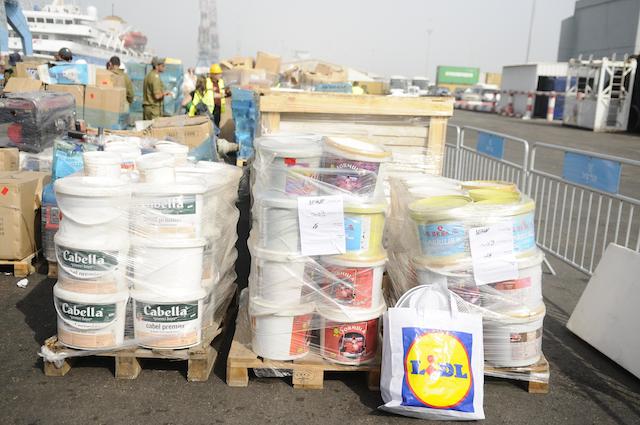UPDATES
NYT quotes Palestinian housing minister: Gaza reconstruction delays not Israel’s fault
August 27, 2015 | Ahron Shapiro

AIJAC policy analysts have, on numerous occasions in recent months, published research showing that Israel is not responsible for the well-publicised delays in rebuilding housing in Gaza that had been destroyed in fighting between Hamas and Israel in last year’s Gaza war. That research has cited sources as diverse as the Arab League, the International Monetary Fund and UN officials (See here, here, here, here, and here).
Yet to this day, politicised NGOs continue to promote the canard – unsupported by facts – that Israel’s limited blockade on Gaza is to blame and must therefore be ended in order for reconstruction to take place.
Now, the New York Times – quoting Palestinian officials in Gaza and ordinary Gazans alike – confirms what AIJAC has been saying all along: The genuine obstacles to reconstruction have been: lack of funds thanks to delinquent payment of pledges from donor countries, misappropriation of building materials to the black market and towards the reconstruction of Hamas’ military infrastructure, including terror tunnels, and intra-Palestinian corruption, rivalries, and mismanagement.
The article by Jodi Rudoren and Majd al Weheid published August 22 as part of Times coverage of the one-year anniversary of the war, investigated the reasons why so little reconstruction has taken place in Gaza since the war in spite of the fact that a framework for reconstruction was put in place shortly after the war’s end.
At that time, Israel and the Palestinians agreed to a reconstruction mechanism that would allow Israel to prevent the misappropriation of civilian construction materials by Hamas for building tunnels and other military fortifications. It would do so by reviewing each construction project’s needs and allowing in only the cement necessary for each home or building.
According to the Palestinian Housing Minister interviewed for the story, the main reason why reconstruction has not taken place is not because Israel isn’t somehow letting in materials, but because billions of dollars of pledged donations for reconstruction – mainly from Arab countries – has not materialised.
[Mofeed M.] Al Hassaina, [the Gaza-based minister of housing and public works as part of the partially-implemented Fatah-Hamas Palestinian unity government], other Palestinian leaders and United Nations representatives all said that Israel had done its part in reasonable time and had allowed cement into Gaza. Empty coffers, they said, are the primary problem.
Even in cases where money has come through for reconstruction and Israel has delivered the building materials, often these materials have simply been sold on the black market. Some of that cement has been finding its way into tunnel building projects by militants, while in some other instances, the cement has simply been wasted, according to the story.
Israeli, Palestinian and United Nations officials acknowledge that cement has flooded Gaza’s black market, with some undoubtedly ending up in the militants’ underground tunnel network – the very thing the monitoring system was set up to prevent.
“We know and believe that some of it goes to the wrong places,” said Maj. Adam Avidan, Israel’s point person on the mechanism. At one point, 18 of 30 beneficiaries bought their full allotment of cement and “went the same day and sold it on the black market,” he said. “They didn’t build their houses.”
About 37,000 tons of cement sits unused in Gaza warehouses, nearing or past its expiration date for load-bearing projects.
To be sure, the story also noted the allegations by Palestinian NGOs and some of their Israeli counterparts that Israel’s “blockade” of Gaza is foremost to blame.
However, in an interview with CNN’s Oren Liebermann on June 2 that also touched on the Gaza reconstruction problems, Col. Grisha Yakubovich from Israel’s Coordinator of Government Activities in the Territories (COGAT) [the body in charge of handing imports of goods and materials to Gaza from the Israeli side] said that the depiction of Israel’s limited restrictions on the import of military and dual-use materials to Gaza as a “blockade” doesn’t jibe with reality.
Liebermann: Are you saying the world is wrong in calling it the Gaza blockade?
Yakubovich: I cannot define it as a blockade. Because I’m using facts, numbers.
You can see the amount of trucks coming and bringing goods to Gaza on a daily basis. You can see the thousands of tons of goods being exported abroad or marketed to the West Bank or even to Israel.
You can see Erez crossing point accessing movement of traders, contractors, of the international community, of patients. People who are going to pray in Jerusalem every Friday.
Understanding that we are dealing with a terror organization, I think that Erez, Kerem Shalom, and the fishing zone of 6 miles, I would not call it whatever you named it.
The market abroad is open for (the Gazans), so whatever they want to export through Haifa port, Ashdod port, or Ben Gurion (International Airport), that is something that they can do freely. And if the market will open for them, I see no obstacles for them to open new markets from all the countries.
Meanwhile, a Palestinian “man on the street” in Gaza also agreed that Israel was not at fault for the delay in reconstruction, telling the Times that corruption and the political divide between Palestinian factions was to blame.
“The real war is now,” Kayed al Zaza, 45, said, complaining that the rebuilding process was unfair and based on money and personal connections. “It’s worse than Zionists’ wars, as it is launched against us by our own divided politicians.”
Abdel Hadi al Ejla, 56, lamented, “Tell me what kind of homeland this is, which lacks homes for its inhabitants.”
Ahron Shapiro
Tags: Media/ Academia





